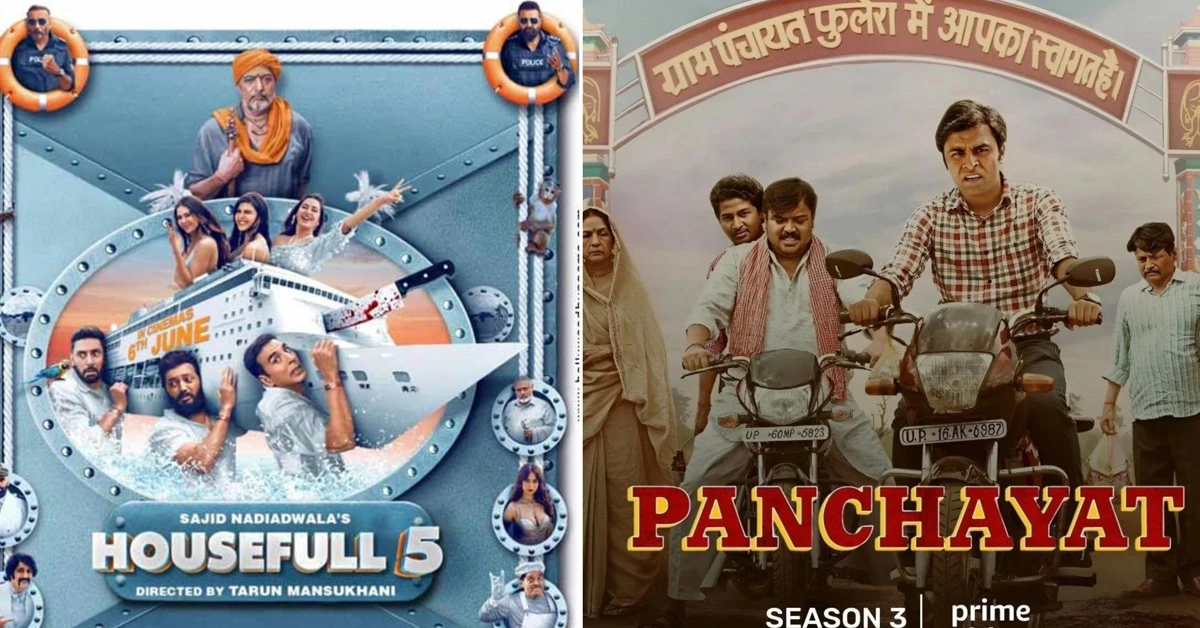
Why does Housefull 5 work commercially? Nostalgia is one reason — audiences who grew up on Govinda's loud comedies or the early 2000s masala hits find familiarity comforting. Then there is escapism. These films offer a detour from the exhausting chaos of real life. They do not demand emotional engagement or moral reckoning. But at what cost do we choose this detour? When misogyny and stereotyping are normalised under the banner of 'just comedy', the joke is ultimately on us.
In today’s entertainment landscape, where loudness often substitutes for laughter and cheap gags pass off as humour, Housefull 5 stands out — but for all the wrong reasons.
A riot of innuendos, misogynistic one-liners, and lazy punchlines, it is less a comedy and more a catalogue of everything wrong with mainstream Hindi cinema's approach to humour. And yet, it is doing big business at the box office.
The problem is also that audiences like such films. That commercial success, far from being innocuous, reflects something darker: our collective appetite for the regressive, the familiar, and the effortless.
Contrast this with Panchayat, a modestly mounted web series now in its third season. Here, the humour is gentle, observational, and deeply rooted in everyday life. Set in a rural Indian village, Panchayat does not shout to be heard.
Its characters are flawed but real; its jokes land not with a bang but with a warm, knowing smile. It offers social insight without posturing. And, most importantly, it respects the intelligence of its audience.
The success of both shows, in different arenas, poses a cultural riddle: what kind of laughter are we chasing? With Housefull 5, the jokes punch down.
Women are the butt of the joke, diversity is a caricature, and physical comedy is exaggerated to the point of absurdity. This is not new territory for Bollywood, of course.
But what is alarming is the persistent popularity of this brand of humour in 2025, when discourse around gender, representation, and narrative responsibility has grown more visible than ever.
So why does Housefull 5 work commercially? Nostalgia is one reason — audiences who grew up on Govinda's loud comedies or the early 2000s masala hits find familiarity comforting.
Then there is escapism. These films offer a detour from the exhausting chaos of real life. They do not demand emotional engagement or moral reckoning. But at what cost do we choose this detour?
When misogyny and stereotyping are normalised under the banner of 'just comedy', the joke is ultimately on us.
On the flip side, Panchayat thrives on empathy. It does not mock its characters but gently reveals their contradictions, their small dreams, and quiet resilience.
It is a reminder that comedy does not have to come at the expense of dignity. The humour comes from insight, not insult; from connection, not conflict.
ALSO READ | Voyeurism, Sales, And The Decline Of Variety In Bollywood's Item Numbers
This split in storytelling points to a larger divide in the Indian audience. One segment craves the crass comfort of exaggerated caricatures.
The other leans towards realism, nuance, and character-driven stories. Both coexist, but not on equal footing. The theatrical market continues to privilege noise over nuance.
Digital platforms, more democratic and less risk-averse, have become sanctuaries for stories like Panchayat.
But the question remains: what does our preference for one over the other say about us? More importantly, what impact does it have on the industry?
Filmmakers go where the money flows. If Housefull 5 succeeds, a dozen more of its kind will follow. And slowly, it erodes standards — not just of humour, but of what we consider worthy of our attention.
This is not a call for banning bawdy comedies or demanding that every show be socially conscious. But in an era where entertainment shapes discourse, even our laughter needs introspection.
Are we laughing with people, or at them? Are we reinforcing prejudices or challenging them?
Because laughter is not apolitical. It never was. And what we choose to laugh at today might well define who we become tomorrow.
ALSO READ | Panchayat's Bhushan And Binod Coming To Assam?
Dipankar Sarkar is a film critic who contributes to different publications- both national and international. He is a Research Fellowship from the NFAI, Pune, India, and was one of the panelists for the selection of world cinema at the 27th International Film Festival of Kerala in 2022.